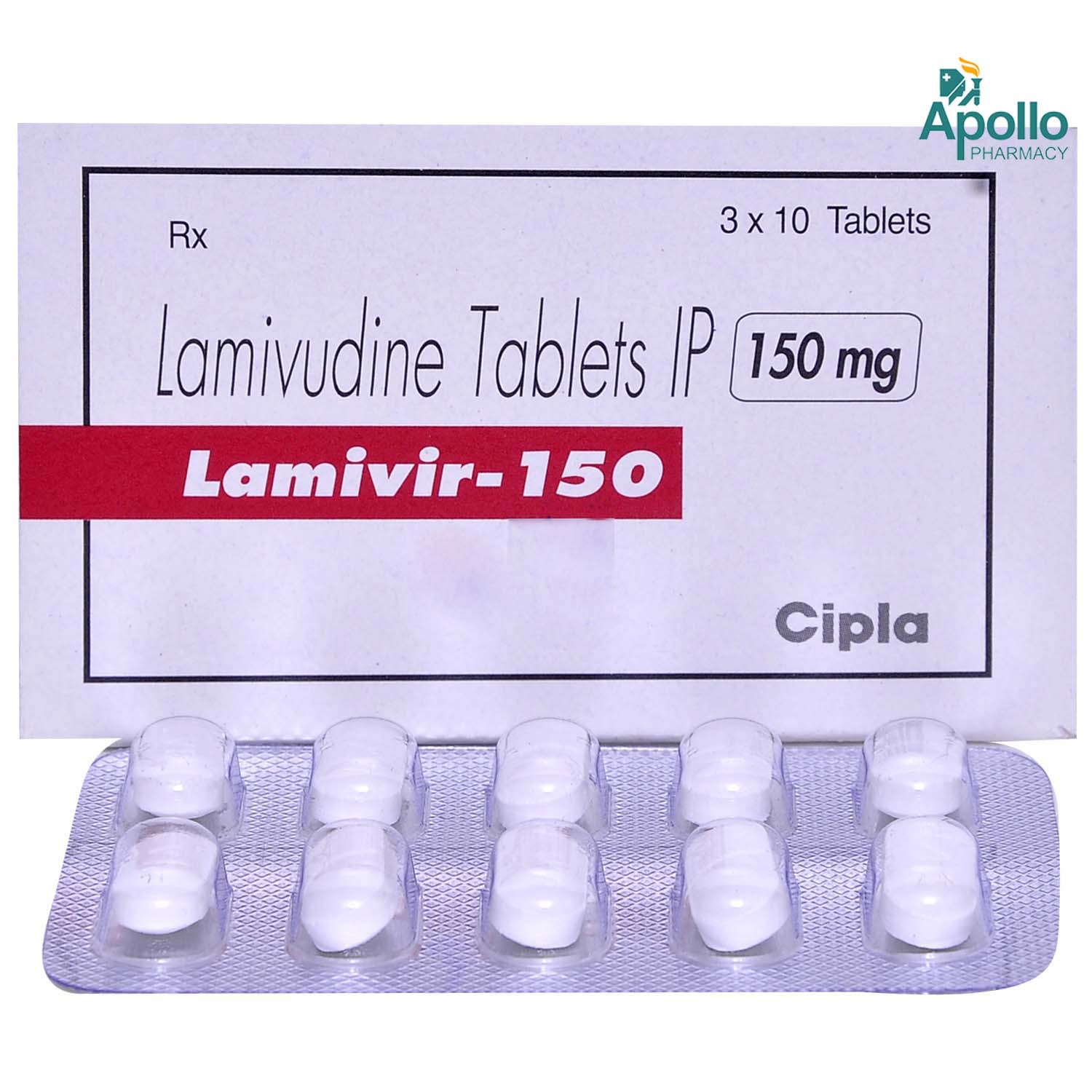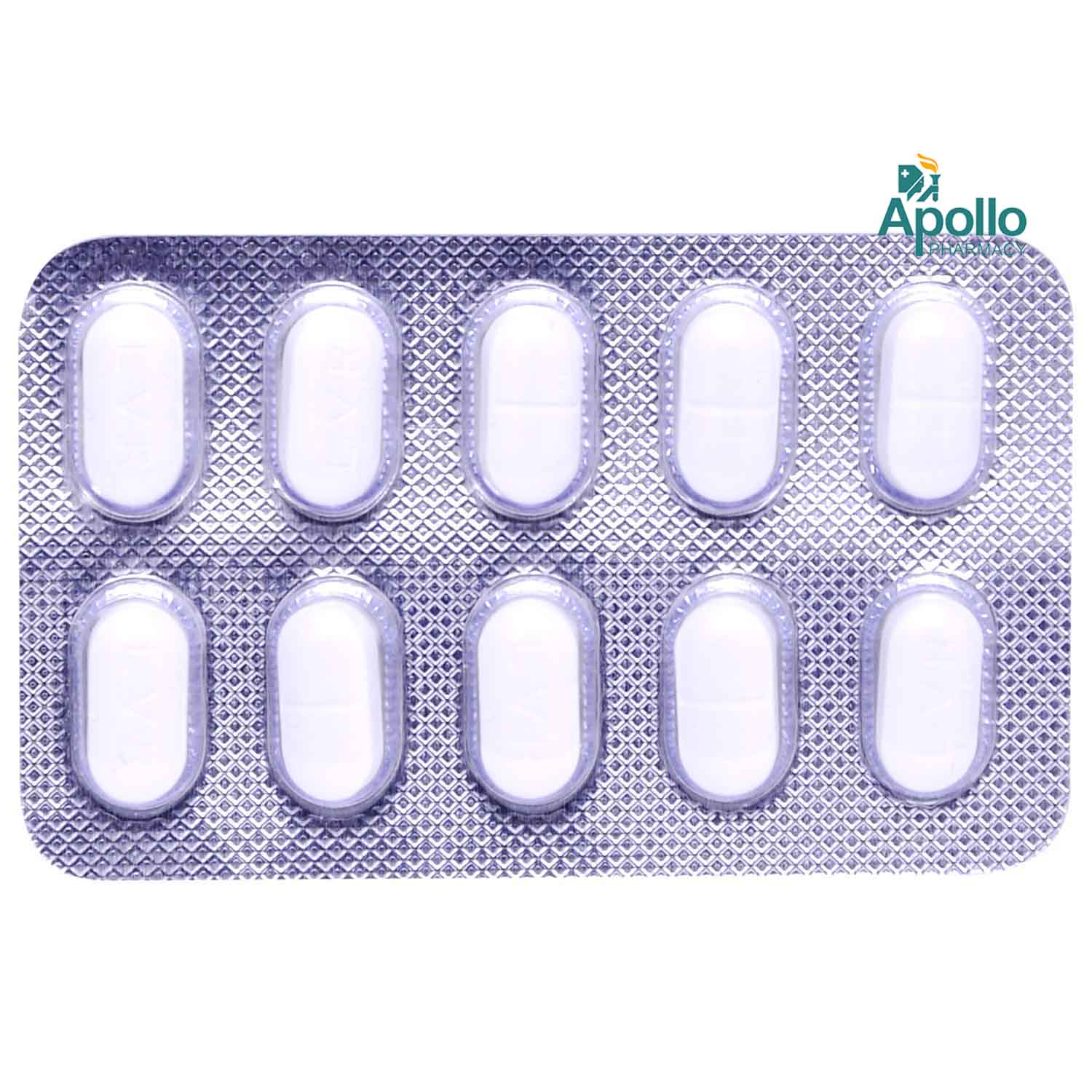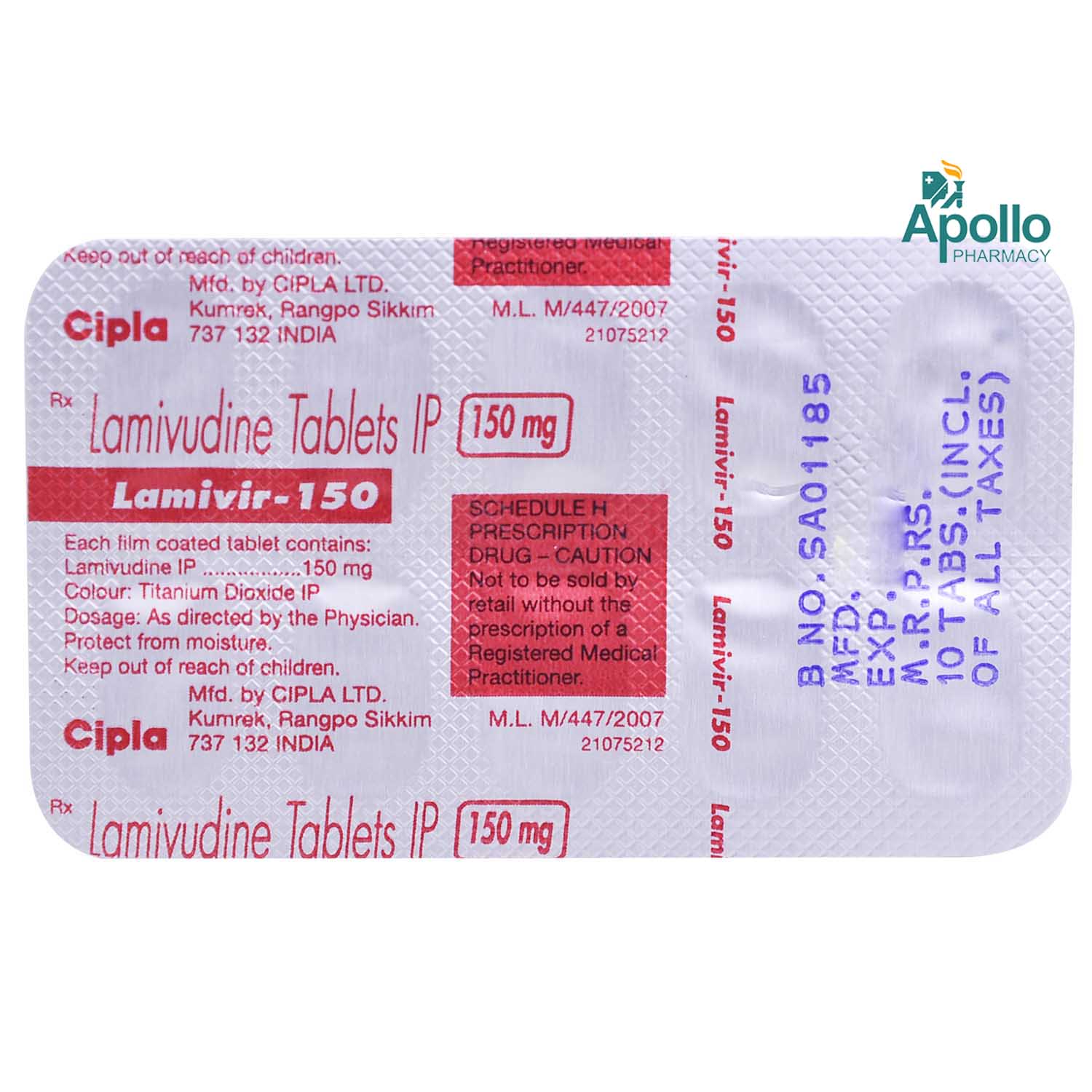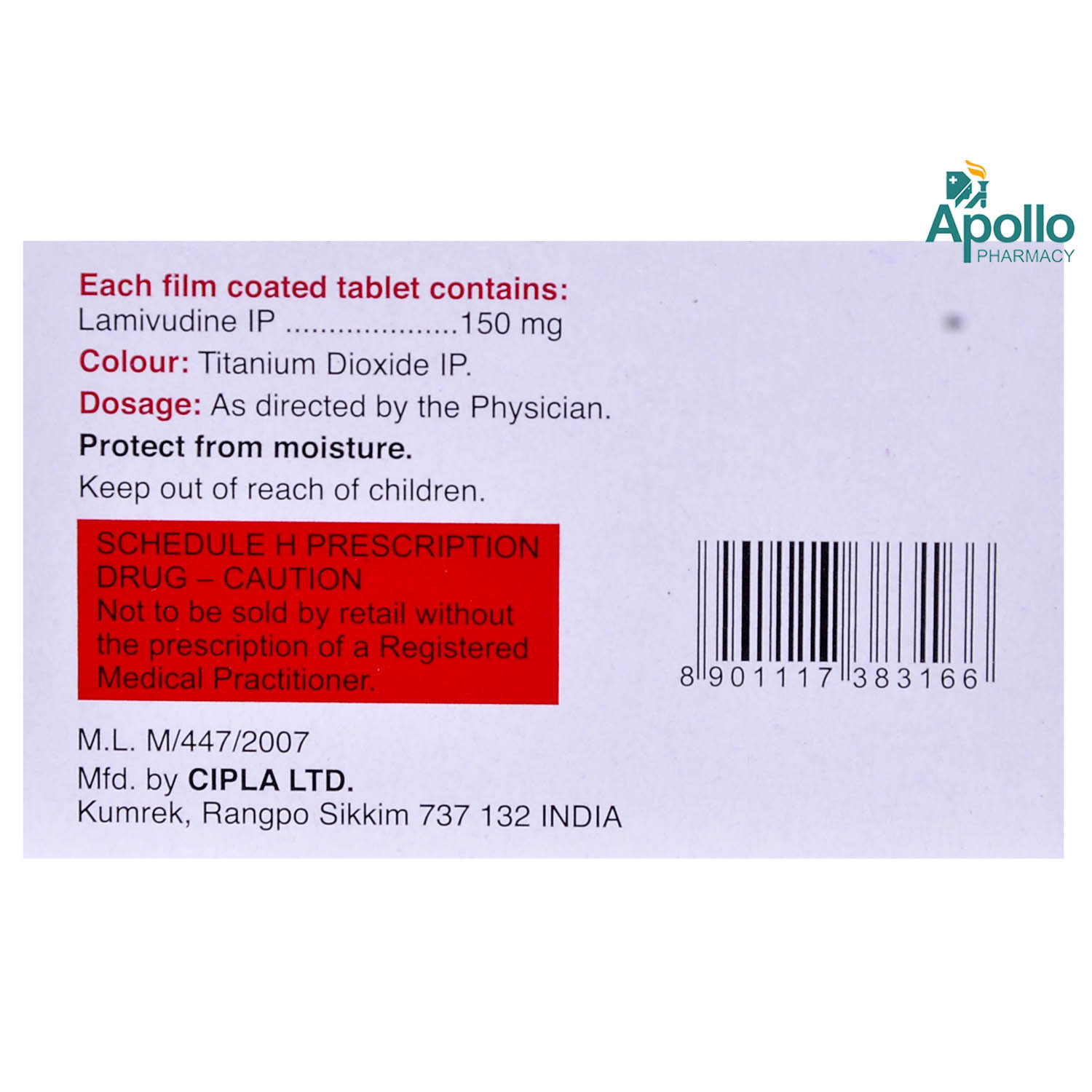Lamivir-150 Tablet 10's
MRP ₹114
(Inclusive of all Taxes)
₹17.1 Cashback (15%)
Provide Delivery Location
Online payment accepted
 Prescription drug
Prescription drugWhats That
Composition :
Manufacturer/Marketer :
Consume Type :
Expires on or after :
Return Policy :
NPPA :
About Lamivir-150 Tablet
Lamivir-150 Tablet belongs to the group of medications called antiretroviral drugs used to control HIV infection and chronic hepatitis B. Human immunodeficiency virus (HIV) is a sexually transmitted infection that, over time, leads to acquired immunodeficiency syndrome (AIDS). Chronic hepatitis B is a long-term viral infection caused by the hepatitis B virus.
Lamivir-150 Tablet contains ‘lamivudine’, which is a ‘nucleotide reverse transcriptase inhibitor’ and works by preventing the development of the virus in human cells. This prevents the virus from producing new viruses and cleans up your infection. It can effectively reduce the symptoms associated with HIV and chronic hepatitis B infection.
Take Lamivir-150 Tablet as prescribed by your doctor. Your doctor will recommend how often you take Lamivir-150 Tablet based on your medical condition. Some people may experience headaches, fever, nausea, weakness, diarrhoea, cough, and runny nose. Most of these side effects of Lamivir-150 Tablet do not require medical attention and gradually resolve over time. However, if the side effects persist or worsen, please consult your doctor.
Do not take Lamivir-150 Tablet if you are allergic to ‘lamivudine’ or any other contents present in it. Patients should take necessary precautions to avoid infecting others. This medicine should not be given to adolescents with a history of kidney failure. If you have liver disease, including hepatitis B or C, then you should not take this Lamivir-150 Tablet . Inform your doctor if you are pregnant, planning to become pregnant, and breastfeeding. Avoid drinking alcohol as it may increase the risk of side effects.
Uses of Lamivir-150 Tablet
Directions for Use
Key Benefits
Lamivir-150 Tablet belongs to the group of antiretroviral drugs used to control HIV infection and chronic hepatitis B. Lamivir-150 Tablet contains ‘lamivudine’, which is a ‘nucleotide reverse transcriptase inhibitor’ and works by preventing the development of the virus in human cells. This prevents the virus from producing new viruses and cleans up your infection. It can effectively reduce the symptoms associated with HIV and chronic hepatitis B infection.
Storage
- Hydrate your body: Drink enough water to prevent dehydration and headaches.
- Calm Your Mind: Deep breathing and meditation can help you relax and relieve stress.
- Rest and Recharge: Sleep for 7-8 hours to reduce headache triggers.
- Take rest: lie down in a quiet, dark environment.
- Cold or warm compresses can help reduce tension.
- Stay Upright: Maintain good posture to keep symptoms from getting worse.
- To treat headaches naturally, try acupuncture or massage therapy.
- Over-the-counter pain relievers include acetaminophen and ibuprofen.
- Prescription Assistance: Speak with your doctor about more substantial drug alternatives.
- Severe Headaches: Seek emergency medical assistance for sudden, severe headaches.
- Frequent Headaches: If you get reoccurring headaches, consult your doctor.
- Headaches with Symptoms: Seek medical attention if your headaches include fever, disorientation, or weakness.
- Include omega-3 rich foods like fatty fish, ground flax, flaxseed oil, and walnuts.
- Consume calcium-rich dairy products for bone health.
- Eat green and leafy vegetables for essential nutrients.
- Include lean protein sources like eggs and whole grains.
- Use herbs and spices for added flavor and nutrition.
- Choose fortified foods for extra nutritional benefits.
- Get plenty of sleep for overall health and well-being.
- Inform your doctor about the nausea and discuss possible alternatives to the medication or adjustments to the dosage.
- Divide your daily food intake into smaller, more frequent meals to reduce nausea.
- Opt for bland, easily digestible foods like crackers, toast, plain rice, bananas, and applesauce.
- Avoid certain foods that can trigger nausea, such as fatty, greasy, spicy, and smelly foods.
- Drink plenty of fluids, such as water, clear broth, or electrolyte-rich beverages like coconut water or sports drinks.
- Use ginger (tea, ale, or candies) to help relieve nausea.
- Get adequate rest and also avoid strenuous activities that can worsen nausea.
- Talk to your doctor about taking anti-nausea medication if your nausea is severe.
- Record when your nausea occurs, what triggers it, and what provides relief to help you identify patterns and manage your symptoms more effectively.
- If you take medication and get severe stomach pain, feel nauseous, vomit, or have a fever, get emergency medical help right away. This could be a sign of pancreatitis, an inflammation of the pancreas.
- Your doctor may alter your treatment plan, provide supportive therapy, or prescribe alternative medications to manage the reaction. They will also perform regular tests to monitor your progress and adjust your treatment as needed.
- Follow your doctor's advice, including dietary recommendations and lifestyle changes, and avoid triggers like alcohol and fatty foods.
- Monitor your condition closely and promptly report any changes, worsening symptoms, or concerns to your healthcare provider.
- If you have excess nerve pain and numbness, soak in Epsom salt and warm water. This can help ease the pain and associated discomfort.
- Use compression socks and make sure to rest for a while to get relief from pain.
- Avoid smoking and intake of alcohol or fluids that aggravate the pain.
- Massage your feet or affected area often to get relief from pain. Take the medication prescribed by your doctor without fail.
- Preventing Vomiting (Before it Happens)
- Take medication exactly as prescribed by your doctor. This can help minimize side effects, including vomiting.
- Having a small meal before taking your medication can help reduce nausea and vomiting.
- Talk to your doctor about taking anti-nausea medication along with your prescribed medication.
- Managing Vomiting (If it Happens)
- Try taking ginger in the form of tea, ale, or candy to help alleviate nausea and vomiting.
- What to Do if Vomiting Persists
- Consult your doctor if vomiting continues or worsens, consult the doctor for guidance on adjusting your medication or additional treatment.
- Inform your doctor immediately if you experience a fever after starting a new medication.
- Your doctor may adjust your medication regimen or dosage as needed to minimize fever symptoms.
- Monitor your body temperature to monitor fever progression.
- Drink plenty of fluids, such as water or electrolyte-rich beverages, to help your body regulate temperature.
- Get plenty of rest and engage in relaxation techniques, such as deep breathing or meditation, to help manage fever symptoms.
- Under the guidance of your doctor, consider taking medication, such as acetaminophen or ibuprofen, to help reduce fever.
- If your fever is extremely high (over 103°F), or if you experience severe symptoms such as confusion, seizures, or difficulty breathing, seek immediate medical attention.
Drug Warnings
Do not take Lamivir-150 Tablet if you are allergic to ‘lamivudine’ or any other contents present in it. Patients should take necessary precautions to avoid infecting others. This medicine should not be given to adolescents with a history of kidney failure. If you have liver disease, including hepatitis B or C, then you should not take this Lamivir-150 Tablet . Hepatitis B has gotten worse when this Lamivir-150 Tablet was stopped in some people with hepatitis B. If you are overweight, especially women, do not take this Lamivir-150 Tablet . Inform your doctor if you have never had hepatitis care before. This medicine contains lactose, so inform your doctor if you have an intolerance to any sugars. People with lactose intolerance Inform your doctor if you are pregnant, planning to become pregnant, and breastfeeding. Avoid drinking alcohol as it may increase the risk of side effects.
Drug-Drug Interactions
Drug-Drug Interactions
Login/Sign Up
Combining these two medications may reduce overall effectiveness due to potential antagonistic effects (opposite actions).
How to manage the interaction:
Taking Emtricitabine with Lamivir-150 Tablet is not recommended, but it can be taken if your doctor prescribes it. Contact your doctor if your symptoms do not improve. Do not stop taking any medication without consulting your doctor.
Teriflunomide can cause Lamivir-150 Tablet to stay in the body longer, leading to higher levels in the blood.
How to manage the interaction:
Although there is a possible interaction between Lamivir-150 Tablet and Teriflunomide, you can take these medicines together if prescribed by your doctor. If you have any of these signs and symptoms, contact your doctor immediately: fever, chills, pain, swelling, bruising, skin rash, itching, loss of appetite, fatigue, nausea, vomiting, abdominal pain, dark-coloured urine, or bleeding. Do not discontinue any medications without consulting your doctor.
Taking Lamivir-150 Tablet and mipomersen together can increase the risk of liver damage.
How to manage the interaction:
Although taking Lamivir-150 Tablet and Mipomersen together can evidently cause an interaction, it can be taken if your doctor has suggested it. If you have any of these symptoms, it's important to contact your doctor right away. These symptoms include fever, rash, itching, loss of appetite, feeling sick, feeling tired, pain in the upper right side of your belly, dark urine, yellowing of the skin or eyes, chills, joint pain, swelling, bruising, loss of appetite, and bleeding. Do not stop using any medications without talking to your doctor.
Combining Lamivir-150 Tablet with Leflunomide can increase the risk and severity of muscle problems.
How to manage the interaction:
Although there is a possible interaction between Lamivir-150 Tablet and Leflunomide, you can take these medicines together if prescribed by your doctor. If you have any of these symptoms it's important to contact your doctor right away: fever, feeling cold, joint discomfort, swelling, bruising, skin irritation, itching, not feeling hungry, tiredness, feeling sick, stomach ache, dark urine or bleeding. Do not stop using any medications without talking to your doctor.
Taking Lamivir-150 Tablet and lomitapide together can increase the risk of liver damage
How to manage the interaction:
There may be a possibility of interaction between Lamivir-150 Tablet and Lomitapide, but it can be taken if prescribed by a doctor. If you have any of these symptoms, it's important to contact your doctor right away. These symptoms include fever, rash, itching, loss of appetite, feeling sick, feeling tired, feeling unwell, pain in the upper right side of your stomach, dark urine, yellowing of the skin or eyes, chills, joint pain, swelling, bruising, stomach pain, liver damage, or bleeding. Do not stop using any medications without a doctor's advice.
Combining these two medications may reduce overall effectiveness due to potential antagonistic effects (opposite actions).
How to manage the interaction:
Although there is a possible interaction between Lamivir-150 Tablet and Zalcitabine, you can take these medicines together if prescribed by your doctor. Contact your doctor if your symptoms do not improve. Do not discontinue any medications without consulting your doctor.
Taking bexarotene together with Lamivir-150 Tablet increases the risk of pancreatitis (inflammation of the pancreas).
How to manage the interaction:
There may be a possibility of interaction between Lamivir-150 Tablet and Bexarotene, but it can be taken if prescribed by a doctor. If you're having symptoms like nausea, vomiting, or abdominal pain, contact your doctor right away. Do not discontinue any medications without consulting your doctor.
Lamivir-150 Tablet can cause higher levels of Sorbitol in the blood by reducing its excretion rate.
How to manage the interaction:
Taking Sorbitol with Lamivir-150 Tablet together can possibly result in an interaction, but it can be taken if your doctor has advised it. Do not stop using any medications without talking to your doctor.
Drug-Food Interactions
Drug-Food Interactions
Login/Sign Up
Diet & Lifestyle Advise
-
Eat a diet with fresh fruits and vegetables.
-
Option for lean meat such as skinless chicken and fish. Limit processed and high-sugar foods.
-
Avoid acidic foods such as tomatoes, lemons, and oranges.
-
Limit alcohol intake and quit smoking.
-
Exercise regularly as it promotes both physical and mental health.
-
Take the necessary precautions to avoid the spread of infection to other people.
Side Effects of Lamivir-150 Tablet
- Headache
- Fever
- Nausea
- Weakness
- Diarrhea
- Cough
- Runny nose
Habit Forming
Therapeutic Class
All Substitutes & Brand Comparisons
RX
Out of StockLamihope 150mg Tablet
Macleods Pharmaceuticals Ltd
₹538.06
(₹8.07 per unit)
21% CHEAPERRX
Out of StockRetrolam 150mg Tablet
Alkem Laboratories Ltd
₹91.8
(₹8.26 per unit)
19% CHEAPERRX
Out of StockLamimat 150mg Tablet
Mylan Pharmaceuticals Pvt Ltd
₹600
(₹9.0 per unit)
12% CHEAPER
Drug-Diseases Interactions
Drug-Diseases Interactions
Login/Sign Up
FAQs
Drug-Drug Interactions Checker List
- ADEFOVIR
- COTRIMOXAZOLE
- CLADRIBINE
- BEXAROTENE
- LEFLUNOMIDE
Special Advise
Your doctor may regularly monitor liver function, kidney function, and bone density if you take Lamivir-150 Tablet .
Disease/Condition Glossary
Human immunodeficiency syndrome (HIV): It is a virus that suppresses the immune system and causes acquired immunodeficiency syndrome (AIDS) over time. The suppression of immunity leads to the development of opportunistic infections. It is a life-long condition, and there is no permanent cure. The treatment (antiretroviral therapy) is given to suppress the infection.
Chronic Hepatitis B: A severe and long-term liver infection caused by the hepatitis B virus (HBV). It spreads by contact with infected body fluids. The symptoms of this condition are abdominal pain, dark urine, and yellowing of the eyes.

Have a query?
Alcohol
Safe if prescribed
Consuming alcohol while using Lamivir-150 Tablet may worsen the condition.
Pregnancy
Consult your doctor
Lamivir-150 Tablet is a category B medicine. If you are pregnant, consult your doctor before taking this medicine. Your doctor may prescribe this medicine if the benefits outweigh the risks.
Breast Feeding
Consult your doctor
Women who are HIV-positive must not breastfeed, because HIV infection can be passed on to the baby in breast milk. A small amount of Lamivir-150 Tablet can also pass with breast milk.
Driving
Safe if prescribed
Lamivir-150 Tablet may cause dizziness. So, avoid driving or refrain from any activities that require you to be alert mentally.
Liver
Consult your doctor
Lamivir-150 Tablet should be used with caution if you have liver problems. Your doctor may adjust the dose of Lamivir-150 Tablet based on your condition.
Kidney
Consult your doctor
Lamivir-150 Tablet should be used with caution if you have kidney problems. Your doctor may adjust the dose of Lamivir-150 Tablet based on your condition.
Children
Safe if prescribed
Lamivir-150 Tablet should be used with caution in children below 2 years of age.















